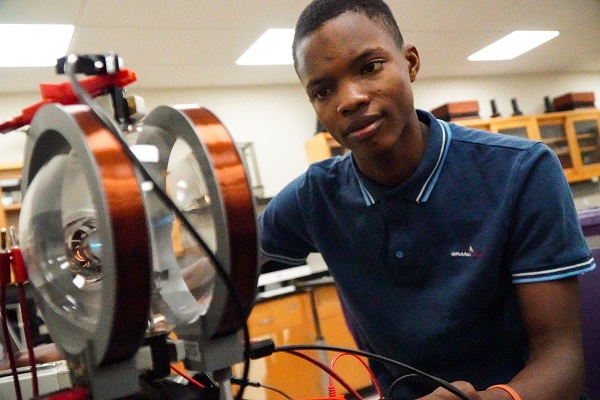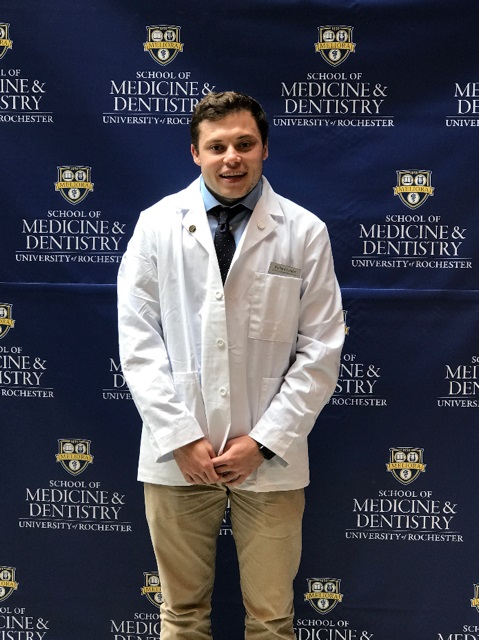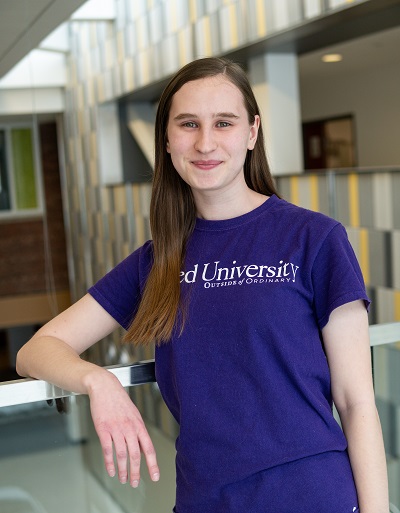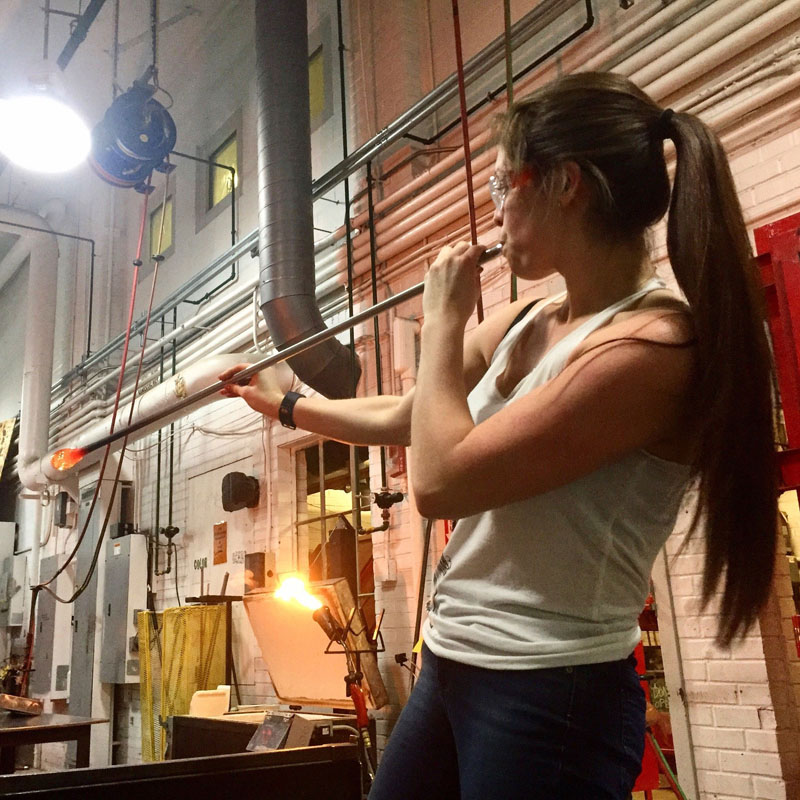Mechanical Engineering
A hands-on program for diverse career opportunities
If your passion is learning how things work by taking them apart and successfully reassembling them, the Mechanical Engineering major at Alfred University is a great fit for you. The program is an ideal education for students looking to enter into industry, develop of their own company, or for a variety of opportunities in education, aerospace, automotive, chemical, and government agencies.
Major
Double Major
Learn More
Minor
- CEMS 214 Structure and Properties of Materials
- CHEM 105 General Chemistry I
- CHEM 106 General Chemistry II
- ENGR 101 Introduction to Engineering
- ENGR 102 Computer Aided Design
- ENGR 104 Computer Aided Engineering
- ENGR 110 Technical Communication
- ENGR 11x Exploration Labs (select 2, 1 credit each)
- ENGR 220 Circuit Theory I
- ENGR 305 Engineering Statistics
- ENGR 306 Engineering Economics
- ENGR 395 Engineering Design
- ENGR 490 Senior Capstone Project
- MATH 151 Calculus I
- MATH 152 Calculus II
- MATH 253 Calculus III
- MATH 271 Differential Equations
- MATH 371 Linear Algebra
- MECH 211 Statics
- MECH 212 Dynamics
- MECH 241 Mechanics of Materials I
- MECH 320 Thermodynamics I
- MECH 321 Thermodynamics II
- MECH 324 Fluid Mechanics I
- MECH 326 Heat Transfer
- MECH 327 Thermal Sciences Laboratory
- MECH 343 Mechanics of Materials Laboratory
- MECH 362 Kinematics and Dynamics of Machinery
- MECH 364 Machine Design I
- MECH 366 Manufacturing
- MECH 417 Introduction to Finite Element Analysis
- PHYS 125 Physics I
- PHYS 126 Physics II
- Mechanical Electives
- Technical Elective
- Humanities, Social Science and Arts electives
For more information, please review the School of Engineering Curriculum by Semester Worksheets by degree program.
Mechanical Engineering is available as a double major to any Inamori School of Engineering undergraduate. Students earning a double major in Mechanical Engineering will complete all required courses for Mechanical Engineering along with courses required for their primary Engineering major.
The minor in Mechanical Engineering is a great option for students majoring in physics, math, chemistry, or any of our other engineering majors.
- MECH 211 Statics
- MECH 212 Dynamics
- MECH 241 Mechanics of Materials
- MECH 320 Thermodynamics
- MECH 324 Fluid Mechanics
- MECH 326 Heat Transfer
- Choice of 300 or 400 MECH
The BS program in Mechanical Engineering is accredited by the Engineering Accreditation Commission of ABET under the General Criteria and the Program Criteria for Mechanical and similarly named Engineering Programs.
If you have varied interests in engineering but are unsure which you excel at or enjoy working with the most, consider exploring our Undecided Engineering pathway. The Inamori School of Engineering provides this option to students who are undecided as first-year students and allows them to discover the field of engineering that's the best fit for them.
| Major | 2022 | 2021 | 2020 | 2019 | 2018 | 2017 | 2016 |
|---|---|---|---|---|---|---|---|
| Biomat. Eng./Biomed Mat. Eng. | 24 | 25 | 32 | 30 | 31 | 33 | 34 |
| Ceramic Engineering | 35 | 39 | 44 | 61 | 68 | 68 | 63 |
| Electrical Engineering | N/A | N/A | N/A | N/A | N/A | N/A | N/A |
| Glass Engineering Science | 11 | 11 | 19 | 23 | 24 | 15 | 15 |
| Materials Sci and Engineering | 19 | 31 | 38 | 36 | 48 | 48 | 48 |
| Mechanical Engineering | 119 | 145 | 167 | 194 | 168 | 182 | 185 |
| Renewable Energy Engineering | 19 | 27 | 40 | 44 | 29 | 30 | 44 |
| Undecided Engineering | 18 | 17 | 34 | 22 | 26 | 26 | 37 |
| Non-Degree | 0 | 0 | 0 | 2 | 4 | 4 | |
| Unduplicated Headcount | 245 | 295 | 374 | 410 | 394 | 402 | 426 |
| Major | 2022-2023 | 2021-2022 | 2020-2021 | 2019-2020 | 2018-2019 | 2017-2018 | 2016-2017 |
|---|---|---|---|---|---|---|---|
| Biomat. Eng./Biomed Mat. Eng. | 3 | 4 | 12 | 7 | 4 | 8 | 7 |
| Ceramic Engineering | 8 | 15 | 8 | 21 | 16 | 12 | 19 |
| Electrical Engineering | 0 | 0 | 0 | 0 | 0 | 0 | 0 |
| Glass Engineering Science | 2 | 2 | 7 | 3 | 3 | 0 | 4 |
| Materials Sci and Engineering | 7 | 15 | 8 | 9 | 16 | 7 | 10 |
| Mechanical Engineering | 28 | 58 | 35 | 53 | 36 | 51 | 37 |
| Renewable Energy Engineering | 13 | 11 | 14 | 6 | 10 | 10 | 12 |
| Total Degrees | 61 | 105 | 84 | 99 | 85 | 88 | 89 |
What Will You Do?
Within the past few years, graduates have obtained jobs as:
- Mechanical Engineer – CAF USA
- Quality Engineer - Amphenol Aerospace
- Group Manager - Anheuser-Busch InBev
- Project Engineer - D.P. Wolff, Inc.
- Design Engineer - Engine Power Source
- Engineering Support Specialist - BAE Systems, Inc.
- Junior Mechanical Engineer - Corning Incorporated
- Design Engineer - Engine Power Source
- Manufacturing Engineer - Harris Corporation
- Advanced Manufacturing Engineer/Data Analyst - Honeywell Aerospace
- Project Engineer, HVAC Safety - Intertek
- Manufacturing Engineer - Owens Corning
- Project Coordinator - Northern Architectural Systems
- Application Engineer - Qualitrol Corporation
Program Educational Objectives
Program educational objectives (or PEOs) are broad statements that describe what we expect graduates of AU's mechanical engineering program to attain 3-5 years after graduation. PEOs are reviewed and revised regularly to ensure that the program educational objectives are relevant to the needs of today's employers.
Objective 1. A few years after graduation, our graduates will be working in a wide range of industries as mechanical engineers who solve fundamental problems, and effectively communicate their work.
Objective 2. A few years after graduation, some of our graduates will be working collaboratively in multidisciplinary teams, and move into positions of increased technical skill requirements and managerial responsibilities.
Objective 3. A few years after graduation, some of our graduates will be pursuing or will have completed advanced degrees in science and engineering, MBA programs, or law school.
Objective 4. A few years after graduation, some of our graduates will be active participants in their profession, including society activities, scholarly publications, and student mentoring.
Program Outcomes (Student Learning Outcomes)
Graduates of the Mechanical Engineering program at Alfred University will have:
- An ability to identify, formulate, and solve complex engineering problems by applying principles of engineering, science, and mathematics.
- An ability to apply engineering design to produce solutions that meet specified needs with consideration of public health, safety, and welfare, as well as global, cultural, social, environmental, and economic factors.
- An ability to communicate effectively with a range of audiences.
- An ability to recognize ethical and professional responsibilities in engineering situations and make informed judgments, which must consider the impact of engineering solutions in global, economic, environmental, and societal contexts.
- An ability to function effectively on a team whose members together provide leadership, create a collaborative and inclusive environment, establish goals, plan tasks, and meet objectives.
- An ability to develop and conduct appropriate experimentation, analyze and interpret data, and use engineering judgment to draw conclusions.
- An ability to acquire and apply new knowledge as needed, using appropriate learning strategies.
Student Stories
Similar Programs
Students enrolling in the Mechanical Engineering major often bolster their education by double majoring or minoring in these other closely related fields:






